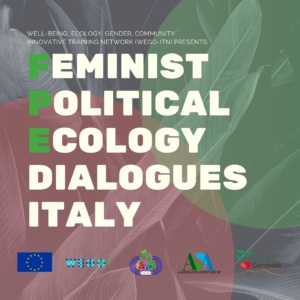In this episode we discuss the Manifesto for the Care Society to share with reflections on what a society centered around care means from the point of view of peasant feminism. We do this in conversation with Federica and Sandra from the Comunità Rurale Diffusa based in Tuscia, central Italy.
The Manifesto for the Care Society started to be conceptualised in March 2020 during the Covid-19 lockdown by collectives, associations, and grassroots movements concerned with the following: ’not wasting the lessons learned from the Covid-19 pandemic, tackling climate collapse and social injustice by repudiating the hierarchy of values and powers that govern the world, to build instead a society of self-care, care for others and for the planet’. This process was intended to bring out ‘an alternative society project, avoiding that, as usual, the different rights and needs are pitted against each other’. Hence the Manifesto was followed by a series of concrete proposals for a “Recovery plan” coming “from below”, to be fed through a permanent and participatory process. It was launched on social networks with an invitation to participate in a national mobilisation on 21 November 2020.
Our collective Tutte Giú Per Terra joined the Manifesto as this reflects the principles of agroecology and ecofeminism in which the collective recognizes itself. In fact, the Manifesto says that ‘no economic production is possible without guaranteeing biological and social reproduction’ , as eco-feminist thinking and indigenous cultures have taught us.
It also states that social reproduction – understood as all activities and institutions necessary for guaranteeing life, in its full dignity – means taking care of oneself, of the other * and of the environment: and it is around these knots that the entire socio-economic model must be rethought.
In other words, The Manifesto recognizes the centrality of agriculture for a society of care, starting from the fact that the Covid-19 pandemic is the result of the systemic violence of the industrial agri-food sector – the same violence that ecofeminism and peasant feminisms all over the world have denounced for decades. From this recognition, the Manifesto deduces that it is necessary to promote the social re-appropriation of ecological resources and of the food supply chain, subtracting it from agro-business and large-scale distribution systems. It reiterates the importance of guaranteeing food sovereignty, or the right of everyone * to nutritious food, produced in socially and ecologically sustainable forms.

Watch – and listen to – the full episodes here:
Episode 1 – An introduction to rural and peasant feminisms
Episode 2 – A dialogue on feminism and care for the territory with Comunità rurale diffusa
Episode 4 – A dialogue on the restanza movement in Irpinia with Maria Laura Amendola
Episode 5 – A dialogue on farmers protests in India with Irene Leonardelli and Arianna Tozzi
Episode 6 – A dialogue on the 8M feminist strike and territorial resistances
Radio Iafue has granted permission to publish the videos on WEGO’s website.

